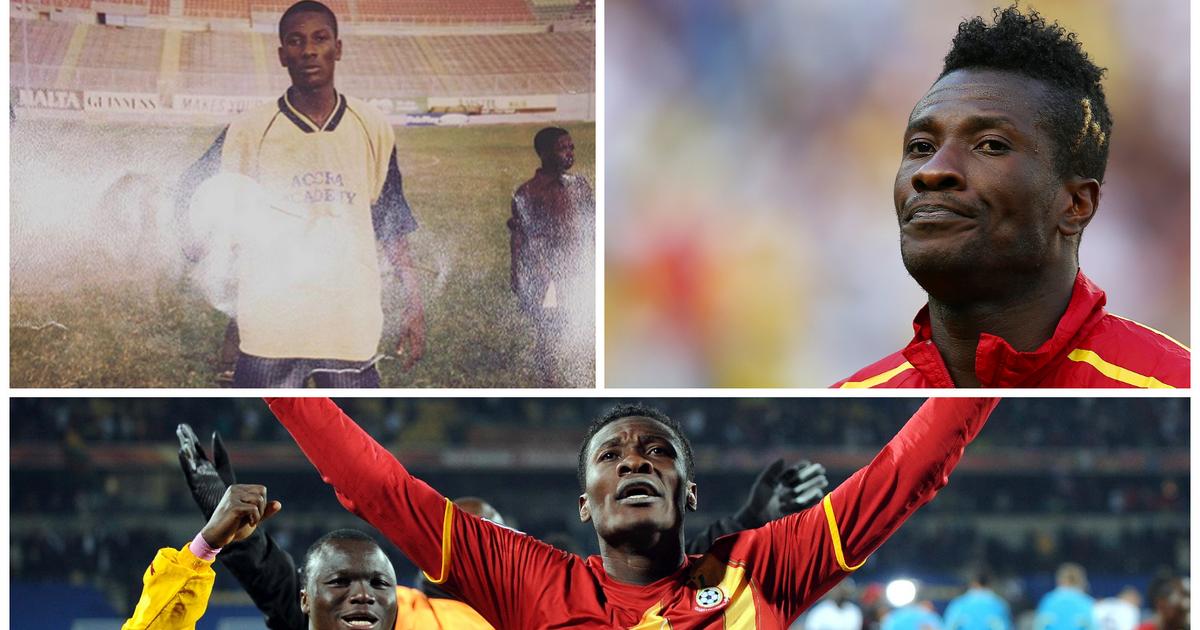Until that moment of individual magic, England had seemed destined for victory after Andy Carroll’s brutish first-half finish gave them a prized lead, and they probably would’ve won against any other team. The problem, though, was that the Three Lions were facing a Ghana side that had Gyan, a player who was at the peak of his powers.
Oh, Asamoah was pumped that day. Making his way into Wembley, the Ghana striker carried on his shoulder a ghetto blaster that filled the area around the visiting team’s dressing room with Afrobeat music. Smiling and lip-synching to the deafening sound, he looked the part of a warrior unfazed by the battle ahead. Later that night, in front of over 80,000 fans, he would elevate himself to celestial heights.
It didn’t even matter which side those supporters had come to see; when Gyan dazzled his way past a sea of English bodies, leaving James Milner static at the edge of the box and bamboozling Joleon Lescott twice – first with a feint and again with his quick feet – the entire stadium froze, anticipation briskly replacing mystification. And when Gyan dropped the shoulder, clipping a composed finish beyond the outstretched Joe Hart in post, Wembley erupted.
It was a brilliant solo goal and another addition to the Ghanaian’s collection of clutch strikes. And though Wembley is not noted for rooting for opposition players, the applause for Gyan when his game was done was in unison, in a match that was probably too competitive for an international friendly.
It is for such regular standout exploits that anytime Gyan dons the national team jersey, Ghanaians herald him as the Baby Jet.
To Asamoah’s own credit, he has had many such memorable moments in his illustrious career; moments that leave the opponent stupefied and fans awe-struck. From the bustle of Accra to the humid climates of Udine and the picturesque skylines of Rennes, to the water-bordered towns of South Tyneside and the greenness of Al Ain, Gyan made sure to sprinkle his stardust in every city he graced.
A man of goals and controversies, very few players divide opinions like Baby Jet. Even as a kid growing up in the suburbs of Ghana’s capital, Accra, Gyan puzzled his teachers as much as he would opposition defenders later in life.
As the story goes, a teacher once asked her pupils what each would like to become in future. Some mentioned doctors and lawyers, others opted for engineering and piloting. A few chose banking and even fewer – to the teacher’s chagrin – ticked teaching. One boy seated in the corner of the classroom wasn’t impressed with the answers, though.
“Come on, tell us,” the teacher pressed. The answer that followed, in an assertive tone, wasn’t quite what anyone expected. “I want to be a footballer and play for the national team and score many goals like [the Brazilian] Ronaldo.”
The other pupils burst into laughter, unable to reconcile their mate’s dreams with the fluorescent career of O Fenomeno, who, only a few years earlier, had been named FIFA World Player of the Year at the age of 20.
That boy, a young Gyan, already knew the world belonged to him. In his autobiography, LeGyanDary, he wrote: “Whenever my friends and I watched a football game and the national team came up in conversation, I’d often prophesy that I would play in the national team one day. That I would take Ghana to the World Cup.
“My comments usually sparked more laughter because even Ghana’s best international players had tried so hard and failed to achieve that feat.”
Gyan would, however, go on to prove his incredulous and amused classmates and friends wrong in some style.
He effortlessly mastered the art of rising to the occasion and scoring headline-grabbing, history-making goals. So much so that, just shy of an 18-month period, between 2010 and 2012, he was arguably the best player in Africa and one of the top five forwards in the world.
That purple patch saw him scoop the BBC African Footballer of the Year award, also landing a Ballon d’Or nomination that eventually saw him finish ahead of the treble-winning Julio Cesar, World Cup-winning Cesc Fabregas, German duo Philipp Lahm and Miroslav Klose, and Brazil’s Daniel Alves in the final ranking.
For all his unwavering self-belief, though, not even Gyan would have deemed such lofty feats attainable; but, then again, everything he does on the pitch and has achieved is a reflection of his experiences.
Born to a mother who was an educationist, Gyan’s eagerness to lecture his colleagues about new skills was unmistakable; fathered by a businessman, making the most of opportunities came naturally to him.
More than anything else, though, Gyan was that happy kid who just wanted to have fun. On the half-dusty, half-rocky pitches of Gbawe in Accra, where he first laced his boots to kick a ball, he was usually more motivated to entertain those who gathered to watch him than he was to actually score goals.
Indeed, if there was any threat to his development into the great striker Gyan would become, it was this tendency to overindulge in fancy stuff. While still an amateur, Gyan was dropped by his coach for showboating and playing to the gallery.
Frustrated to be left on the bench in the next game and after watching his teammates struggle and concede first, he begged to come on. He ended up bagging four goals in the second half to earn his side a 4-1 win. More than just his singlehanded heroics, this time, he learned a lesson about collective play.
“It was at this critical point that I began to learn the ropes of football team culture: how to be a team player, leadership skills, respect for teammates and officials, conflict resolution, how to respond to coaches, comportment on and off the field… the whole nine yards,” Gyan wrote in his autobiography, LeGyanDary.
UK Babies (they have no connection to the United Kingdom) – an Under-10 colts team – were Gyan’s first club. Even at such a young age, his talent was telling. He became the face of the team and with each impressive performance, he won over more fans within and outside the neighbourhood. In his oversized jersey, Gyan captivated everyone who watched him play and became some sort of a local superstar.
At UK Babies, Gyan was mainly a utility player and was usually deployed at left-back and sometimes on the flanks. The one thing the coaches there failed to properly spot, though, was his eye for goal and, it wasn’t until he swapped the club for another called Mighty Victory, that he was fully converted into a striker.
Before his life-changing move to Liberty Professionals in 2003, Asamoah was a student at Accra Academy, the high school where his footballing potential was first taken seriously.
Under the tutelage of sports master and professional football coach J.E. Sarpong, he would blossom into the school’s top striker. But his talent came with its baggage; excesses that needed to be checked if he was to fulfil his enormous potential.
Sometimes, he came across as overconfident and petulant because he was clearly better than his playmates. Once he managed to cut those excesses out of his game and his personality, however, with the help of Sarpong’s tough love, Gyan blossomed into the best version of himself and was well on his way to the top.
When he signed his first professional contract with Liberty as a teenager, everyone already knew the name Gyan. But it wasn’t Asamoah’s that they were accustomed to, it was Baffour’s, his senior brother, who was already a regular with the national team. Back in school, many referred to him as “Baffour’s brother”. Determined to make his own name, Baby Jet took his chance.
A loan spell to second-tier side Stay Cool FC presented the perfect opportunity for Gyan to prove his worth. Goal after goal, his reputation burgeoned, and it quickly became evident that his talent deserved a bigger stage.
Gyan returned to Liberty as a more mature finisher. His goals powered the club to a fourth-place finish in the Ghana Premier League, earning him a senior national team call-up at 17, where he scored twice on his debut against Somalia at the start of Ghana’s quest to reach a maiden FIFA World Cup. And although he departed for Udinese midway through that debut season, Gyan’s 10 goals in 16 matches would see him finish as runner-up in the race for the league’s golden boot – just three shy of eventual top-scorer Shaibu Yakubu.
Gyan’s move to Serie A may have come at the right time but, at 18 and being separated from his family, adapting to the weather and culture of another country was always going to be challenging. Still very much a kid, scrawny and all, Gyan struggled to settle into his new surroundings and saw just six minutes of action for Le Zebrette in the 2003/04 season.
For Ghana, however, Gyan was still very key, starring in the country’s qualification for the 2004 Olympic Games in Athens and impressing at the competition proper.
Back at Udinese, Gyan was clearly not satisfied with sitting on the bench, so when Serie B side Modena offered a temporary escape, he jumped at it.
There, in the city of balsamic vinegar and rich opera heritage, Gyan would regain his mojo, scoring seven goals in his first season. He’d be forced to stay at Modena for one more year, as Antonio Di Natale’s form meant there was still no vacancy upfront at Udinese.
Eight goals in 25 matches later, however, Gyan was now ready to return to Udinese as a starter ahead of the 2006/07 campaign. He would also take his form into that summer’s World Cup in Germany, helping Ghana to reach the round of 16 in their debut appearance.
Gyan had finally realised his childhood dream of playing in a World Cup with Ghana but that was not without entering his name into his country’s folklore for mixed reasons, with a number of firsts. Typical of the Jekyll and Hyde anecdote that Gyan’s whole career became known for, he scored Ghana’s first-ever World Cup goal, became his country’s first player to miss a penalty in the tournament and was also the first Ghanaian player to be sent off at the Mundial.
Gyan returned to Udinese after the 2006 World Cup with a load of experience, exposure and expectations. Trusted by Giovanni Galeone in a two-top system, Asamoah repaid his manager’s faith with eight goals and three assists in his first full Serie A season. He formed a formidable partnership with the more experienced Di Natale, a master-and-apprentice combo that the Friulani adored.
But a serious knee injury to Gyan would break up that exciting double act, restricting him to just 13 appearances and three goals the following season. Unable to reclaim his position in the team after recovering from injury, Gyan would spend the next two years at Ligue 1 side Stade Rennes, where he scored a then career-best of 13 league goals in the 2009/10 season.
The sight of Gyan wheeling away after making the net bulge and turning many football grounds into dance floors became his calling card, and the world couldn’t get enough of it in 2010, his annus mirabilis.
That was the year in which Gyan announced himself as Ghana’s man for the big occasion, unlocking that elite temperament that saw him prove influential as the West Africans pursued objectives at the Africa Cup of Nations (AFCON) and the World Cup.
Like a man possessed, he completely dominated both tournaments, singlehandedly deciding games and bearing the hopes of millions of Ghanaians and Africans.
Ghana headed for the AFCON in January 2010 with a depleted squad. The Black Stars were without captains Stephen Appiah and John Mensah due to injuries, while Inter Milan’s Sulley Muntari was dropped over disciplinary issues.
Chelsea’s Michael Essien came along for that trip to Angola, only to be ruled out for the rest of the tournament by a serious knee injury suffered in Ghana’s opening group game against Ivory Coast.
The mantle, then, fell to Gyan to lead the team. At just 24, it was a huge responsibility but he carried it out with passion, grit and aura. Throughout Gyan’s career, it was in such moments of despair that he often channelled his inner ‘Avenger’ hegemon to inspire belief among his compatriots.
After making a slow start to the tournament, scoring just once in the group stages, Gyan truly flew into Superman mode during the knockout rounds.
If the youthfulness of Ghana’s squad and the general lack of characters going into the tournament appeared to count against the Black Stars, the compact unit into which Serbian trainer Milovan Rajevac fashioned the elements at his disposal was the group’s main strength.
The Black Stars were notoriously stingy in defence but smart enough to hurt their opponents at the other end, thanks to Gyan’s prolificacy, with any chance that came their way.
Ghana never scored more than one goal in any of their matches en route to making the final – the ‘one-goal project’, it was called – and much of that game plan hinged on the presence of Gyan, a striker adept at adapting to adversity.
In the quarterfinals against hosts Angola, with chances at a premium and Ghana largely playing on the back foot, it was Asamoah’s 15th-minute strike that ultimately separated the two teams. The striker reprised his match-winning role in the semi-final against sub-regional rivals Nigeria, scoring with a towering header to clip the wings of the Super Eagles.
The final, too, was decided by a lone goal, this time scored by an Egypt side that jetted off to Cairo with a third successive title, rendering Ghana’s smash-and-grab tactics and Gyan’s one-man heroics inadequate for once.
Despite missing out on AFCON glory, Ghana were gallant in defeat and Gyan, deservedly, drew the bulk of the attention. His great campaign with Rennes that season also didn’t go unnoticed and, before long, some of Europe’s elite clubs started circling. Gyan justified and increased that interest throughout the summer’s World Cup in South Africa. His three goals at that tournament powered Ghana to, and almost beyond, the country’s wildest dreams.
Paired in a tough group alongside Germany, Serbia and Australia, the 24-year-old’s winner against Serbia got Ghanaians believing, his equaliser in a 1-1 draw against Australia – a goal that ultimately sealed the Black Stars’ place in the knockout stages – also pulled the rest of Africa along. However, it was his iconic strike against the USA in the last 16 that converted the rest of the world into Ghana fans, making the Black Stars the team of the neutrals and everyone else’s second-favourite team at the World Cup.
With the game extending to extra time after Landon Donovan had cancelled out Kevin-Prince Boateng’s early opener, both sets of fans desperately cried out for a hero. While none of the American players could turn the desires of the fans into reality, Gyan responded with one of the greatest goals in World Cup history to win the game for Ghana.
Never mind that the odds were firmly stacked against him when he found himself in a two-on-one situation against Carlos Bocanegra and Jay DeMerit; Gyan relished the battle, took them on and won, before finishing with aplomb.
As the fighter that he is, Asamoah beat the American duo in a race to Andre Ayew’s hoofed clearance. A wobbly Gyan then shrugged off Bocanegra’s shove to chest the ball away from his markers and, even without regaining his bearing, fired a left-footed shot past Tim Howard to give his country a 2-1 victory that made Ghana, at the time, only the third African team to stand among the last eight teams of any edition of the World Cup (Morocco have since reached the semi-finals).
This was virtuoso. Like poetry in motion, it was vintage Gyan, pirouetting in all his glory, bringing smiles to the faces of Ghanaians for the umpteenth time and leaving the opponent red-faced.
The faces that turned red next, though, were Ghanaians’. Gyan and his country’s fairytale run would come to an end in the closest and cruellest possible way, in a game against Uruguay that would go down as one of the best, yet most controversial in the World Cup.
And Gyan, despite his heroics all tournament, would assume the role of malefactor after missing a crucial penalty that would’ve seen Ghana make unprecedented history for an African side by advancing to the semis.
Depending on who you ask, Gyan wasn’t the true villain of the night. Most people (bar Uruguayans) would name Luis Suarez as the more eligible racketeer. Suarez threw sportsmanship to the dogs by using his hand to prevent a goal-bound header from Dominic Adiyiah in the 120th minute of extra time.
The Uruguayan forward was rightly sent off for his transgression and Ghana awarded a penalty, but Gyan – ever so reliable from the spot – fluffed his lines this time, with his shot ricocheting off the crossbar before flying into the stands.
Although Asamoah demonstrated remarkable mental fortitude by picking himself up to score Ghana’s first in the ensuing shootout, the Black Stars were ultimately beaten 4-2 on penalties by the South Americans.
It was a jarring way for Ghana’s tournament to come to an end and Gyan’s missed penalty, rather than his, and his country’s, amazing run in the tournament, seized the front pages of the local and global press. That would, however, not stop Sunderland from breaking the bank to bring the Ghanaian to the Stadium of Light in the summer of 2010. Gyan would later reveal that Black Cats manager Steve Bruce confessed to “signing me because of my mental toughness.”
And he would immediately hit the ground running in England. Coming on as a second-half substitute for Bruce’s side against Wigan Athletic on his Premier League debut, Gyan immediately introduced himself to the Black Cats faithful with a trademark goal.
No sooner had Jordan Henderson, then fresh out of the Sunderland youth system, produced a cheeky piece of skill to beat his marker on the right flank than Gyan raced into space to wait for the needed service. Henderson obliged, pinging a cross that gave the striker just enough time to apply a first-time volley.
With that, Gyan gave English fans a taste of his on-pitch alchemy with a first Premier League goal, and an encouraging sign of things to come. Goals against Tottenham, West Ham, Stoke City and Blackburn Rovers followed and Baby Jet would end that first season in England with 10 goals and five assists in 31 matches, with the highlight of that campaign coming in a memorable performance away at Chelsea.
When the Black Cats ran riot at Stamford Bridge with a 3-0 thrashing of the Blues, Gyan was the protagonist. Confusing Avram Grant’s men with his smart movement, Asamoah sat Petr Cech down before curling the ball past the goalkeeper. He would go on to create an indelible celebration by displaying a flamboyant dance that enticed teammate Boudewijn Zenden into becoming a highlight reel following the poor Dutchman’s hilarious attempt to imitate the striker’s moves.
The year ended with several apotheosies but Gyan’s penalty miss against Uruguay wouldn’t be forgotten so easily. He would later reveal that he received threats over that incident and, but for his mental toughness, his career might never have recovered from that dark episode.
It was a low point in the striker’s fledgling football métier, bringing back memories from two years prior when Gyan nearly walked away from the national team at the young age of 22.
That was when Ghana hosted the AFCON, in 2008, burdened by the need to end a long trophy drought that dated – and still dates – back to 1982.
A 100% win record in the group stage strengthened conviction that the host-and-win hopes could be realised, after all, but one particular Ghanaian was feeling very little of that positivity. In the aftermath of a 1-0 win over lowly-ranked Namibia, fans turned on Gyan for wasting a couple of gilt-edged chances, including one that saw him fail to score when presented with an open goal.
Booed until he was substituted in the second half, Gyan struggled to deal with all that abuse. At the start of the AFCON, he – scorer of Ghana’s first goal in the opening game – had been the toast of the nation, accustomed mainly to receiving cheers.
But here he was, in front of 40,000 supporters at the Accra Sports Stadium and served only with jeers. As her son suffered on the pitch, Gyan’s mother was also being subjected to threats and her home was even besieged by an unruly few.
In a desperate attempt to shield their family from harm, the Gyan brothers – Asamoah and Baffour (remember him?) – decided to quit the national team with the tournament still ongoing. It took the intervention of Ghana’s head of state at the time, John Agyekum Kufuor, to get the duo to rescind their collective decision.
But even after moving on from those early setbacks to achieve so much – Ghana’s all-time top-scorer and second most-capped player, Africa’s highest scorer at the World Cup, the first footballer to score in nine consecutive major international tournaments (a record only equalled by Cristiano Ronaldo at Euro 2020 and ultimately overtaken by the Portuguese star at Qatar 2022) – there are those who believe Gyan could’ve done even more for his country.
He may have shrugged off criticism, but the regrets never went away. Gyan’s costly penalty miss against Uruguay remains a bitter pill for some fans to swallow, as would that against Zambia in the AFCON semi-finals two years later, which Ghana went on to lose.
With the criticisms and insults rolling in from all angles, Gyan’s endearment began to wane a bit among some of the fans. Even worse, he lost his mother in November 2012 in a car accident and a week later, he would publicly announce his decision to excuse himself from penalty-taking duties for Ghana. That decision, despite being unpopular and interpreted as a sign of weakness, was, according to Gyan, his mother’s last wish.
Not one to cower to his emotions, though, Asamoah declined to take a break from playing football. And exactly 44 days later, he would captain Ghana into the 2013 AFCON. His first goal in that tournament came against Niger in Ghana’s final group game but his decision to stay off penalties came back to haunt him and the Black Stars.
When Kwasi Appiah’s side faced Burkina Faso in the semi-finals, the Ghana boss needed his best shooters around when the game stretched into penalties after a pulsating 1-1 draw in regulation and extra time. Having quit taking penalties for the national team, Gyan stuck to his guns, opting to be substituted before the lottery of spot-kicks kickstarted.
The Black Stars would go on to lose 3-2 on penalties to the Stallions, with Gyan cutting a frustrated figure on the bench as three of his teammates missed their kicks. That the team’s best penalty taker and captain watched on as they suffered heartbreak didn’t sit well with some fans. For them, he turned his back on his country when they needed him most and the striker became even more unpopular for the fact that, while he refused to take penalties for Ghana, he was kicking and scoring them at club level.
Gyan’s leadership qualities would also be questioned when, as captain, Ghana was exposed to international ridicule following a player mutiny at the 2014 World Cup which saw them boycott training over delayed payment of bonuses. There was also an exchange of blows between a player and a management member, petulance towards coaching instructions and, most embarrassing of all, the government of Ghana had to fly $3 million in cash via a chartered aircraft to Brazil to appease the disgruntled players – a disgraceful episode that was captured live on Brazilian television Globo as it all unfolded, before defender John Boye was later filmed kissing his share of the bounty after the wads of cash had been delivered to the players.
Twelve months later, Gyan would once again come under the spotlight for another act of poltroonery. Ghana were presented with their best chance of ending their long trophy drought when they reached the final of the AFCON in 2015. However, nothing could separate the Black Stars and fellow finalist Ivory Coast. By the time the penalty shootout kicked off, though, Gyan had already been replaced by Emmanuel Agyemang-Badu, having personally demanded it, once again deciding not to have anything to do with the spot-kicks. It’s a decision that would turn out to cost his country, and himself, dearly. Despite taking a 2-0 lead in the shootout, Ghana ended up bottling their lead as Ivory Coast rallied their way back to win 9-8, denying the Black Stars the AFCON title.
Many years on, Gyan would finally admit that he regrets that act of pusillanimity.
“I feel like if I was not substituted, I could’ve helped in the penalty shootout. But due to some things that were going on, I felt I needed to give the chance to another player,” he conceded in a 2022 interview.
“This was because I had excused myself from taking penalties. But there were a lot of things going on which led to me asking to be substituted. So I say that was one of my biggest regrets as a captain.”
Ironically, though, in a friendly against the USA in 2017, Gyan elected to take a penalty… and missed, before compensating with a spectacular free-kick from over 30 yards in a 2-1 loss.
That goal, the last of his record 51 for Ghana, came in a game that provides a perfect vignette of the vicissitudes of Gyan’s international career: heroic one moment, a letdown in the next.
Perhaps it wouldn’t have been so difficult for Gyan to be accorded his rightful place in Ghana’s football history – the greatest ever to do it, arguably – if his highs and lows weren’t so often mentioned in the same breath.
By the time Ghana graced AFCON 2019, Gyan was 33 and usurped by Jordan Ayew as the team’s main striker. He was also stripped of the captaincy, which he didn’t take lightly and responded by retiring from the national team for the second time, only to make a U-turn after yet another intervention by Ghana’s head of state. No longer as athletic and without the needed fuel, Baby Jet did not start any game in Egypt and was completely left out of Ghana’s squad for the 2021 edition of the tournament in Cameroon. His club career also began fading.
Upon leaving Sunderland, Gyan joined Al Ain of the United Arab Emirates – first on loan, then permanently – in a move that saw many in his homeland question his ambition.
But Gyan scored plenty of goals there, and earned a lot of cash as well, before spells at Shanghai SIPG, Al Ahli Dubai, Kayserispor, and India’s NorthEast United. Those weren’t as successful, however, and he eventually found his way back home, 17 years after he’d left as a mere boy.
Joining Ghana Premier League side Legon Cities sparked huge fanfare, understandably, but the transfer failed to meet anyone’s expectations. Gyan barely played, with injuries limiting him to just six games before he parted ways with the club in November 2021.
The mind was willing, but his 35-year-old body just couldn’t keep up. These days, he features as a pundit on television and graces draws held by the CAF, alongside retired footballing greats from the continent. He is also very big on philanthropy, having financed an astroturf pitch at his alma mater Accra Academy. He has also spent over a million dollars on charity, including providing medical equipment for hospitals across the country and sponsoring the education of less-privileged kids.
Gyan may have had his lows, but his has been a story of overcoming adversity several times to achieve his dream of becoming a professional footballer. He’s one of few who can hit their chest and say they battled life – both literally and figuratively – and won, as he did when he accepted loan spells to lower-division sides to start from scratch and as was the case when he survived being born prematurely after his mother was forced into induced labour to save both of their lives.
On the latter episode, Gyan would boldly declare in his autobiography: “I entered the great stage called earth; defiant and without permission or notice to anyone. And throughout my life, I would not require anybody’s permission to be myself or to be great.”
That defiant spirit has always stayed with him in his personal and professional life.
It doesn’t matter whether it’s at age 14, when Gyan confronted the no-nonsense father of his first love for trying to stop his daughter from dating him; or at 24, when he summoned the courage to take Ghana’s first penalty in the shootout against Uruguay after earlier missing one with the last kick of the game during the World Cup quarterfinals; or even at 38, when he publicly renounced Ghana’s ruling party, the NPP, and resigned from his role as Chairman of the sub-committee on youth and sports after disagreements with the hierarchy of the political party; Gyan has never been the type to stay down after suffering a setback.
His career has certainly lived up to that as he officially bowed out of the game at 37 last year.
In his prime, Gyan was a beast in front of goal, but also a flawed genius – the kind that was never shy to own up to his imperfections. Here was a man to whom goals came as naturally as controversies, a footballer who divided opinion like no other.
Baby Jet gracefully retired as one of the greatest scorers in international football with 51 goals from 109 caps, a return that puts him ahead of legendary strikers like Francesco Totti, Ruud Van Nistelrooy, Patrick Kluivert, Hernan Crespo, Raul Gonzalez, Alan Shearer and Alessandro Del Piero.
He is also among the quickest players to reach 50 international goals, edging both Cristiano Ronaldo and Lionel Messi in that regard. Gyan reached half-a-century of goals for Ghana in just 103 matches while the Portuguese and Argentine stars needed 114 and 121 games, respectively, to hit such a landmark.
In the end, Gyan wasn’t always the exemplary role model off the pitch, but, on it, he was dedicated and committed to a fault, especially to his country. And that fact, even if he has no silverware to show for such a sterling record of national service, is beyond all reasonable doubt.
In a Ghana shirt, there has been no greater scorer than Gyan and there might not be for a while… Not bad for a boy who was ridiculed for daring to dream of following in the footsteps of Ronaldo.

















